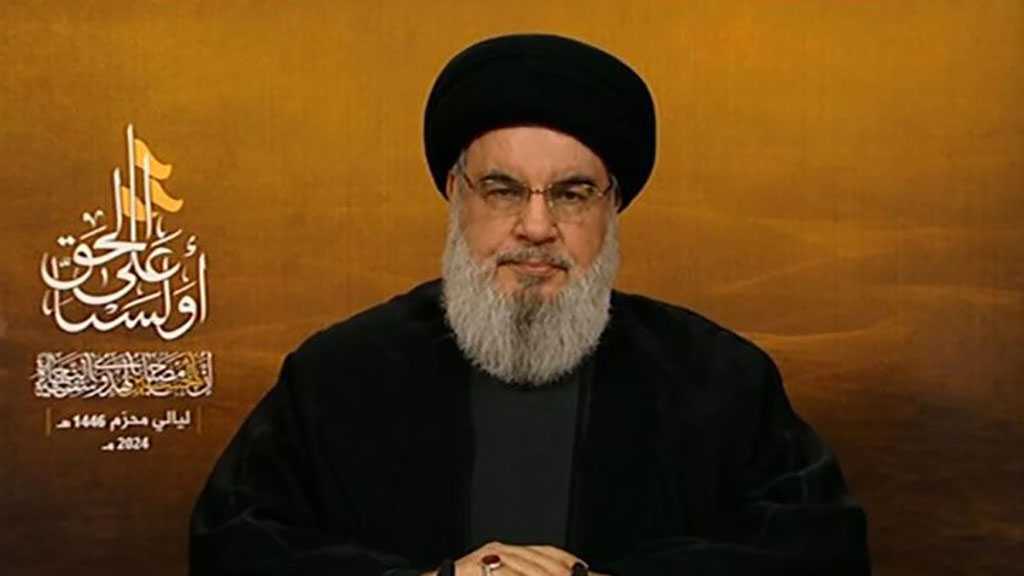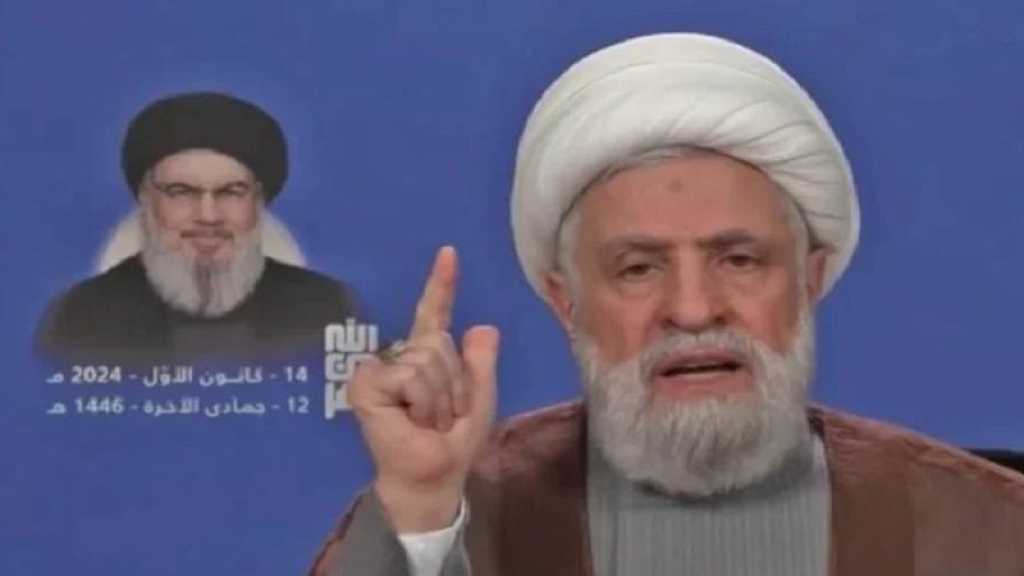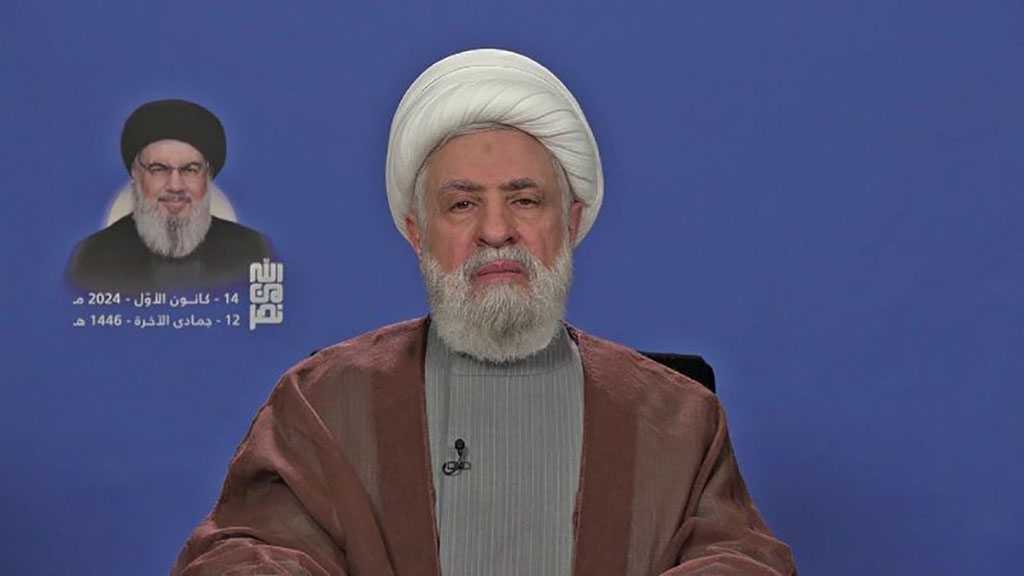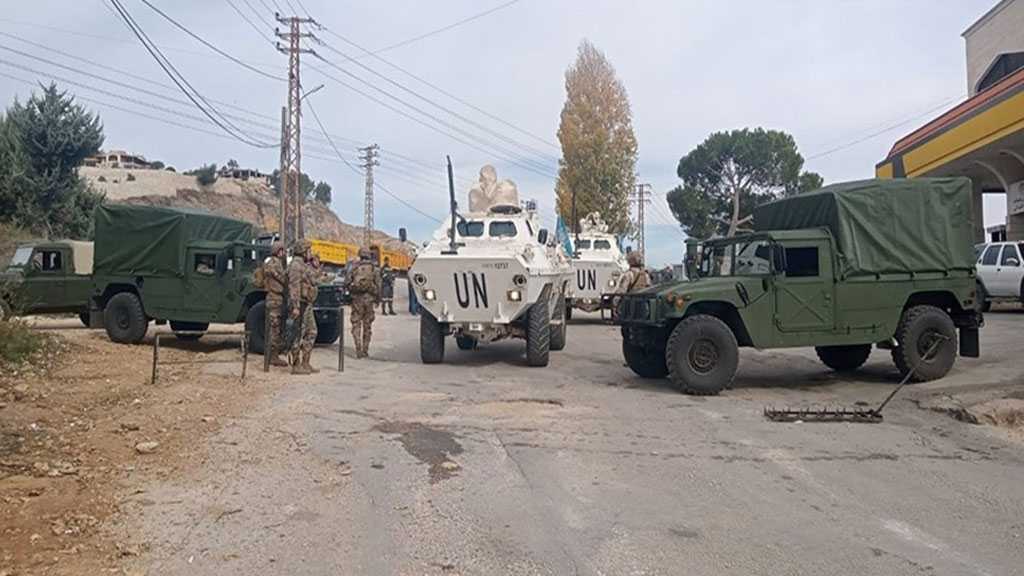The Political Part of Sayyed Nasrallah’s Speech on the 1st Day of Muharram

By Al-Ahed News, Hezbollah Media Relations
Hezbollah Secretary General His Eminence Sayyed Hassan Nasrallah’s speech on the first day of Muharram 1446 on Monday, July 9, 2024 at the Sayyed Al-Shuhada [AS] Complex in Beirut's Southern Suburbs.
I seek refuge in Allah from the accursed Satan. In the name of Allah, the Most Gracious, the Most Merciful. Praise be to Allah, Lord of the Worlds, and prayers and peace be upon our Master and Prophet, the Seal of Prophets, Abi al-Qassem Muhammad Bin Abdullah, and his good and pure household and his good and chosen companions and all the prophets and messengers.
Peace, mercy, and blessings of Allah be upon you all.
Peace be upon you, O my master and my chief, O Abu Abdullah, and upon the souls that gathered in your courtyard. Peace of Allah be upon you from me forever as long as I am existent and as long as there are day and night.
May Allah not cause this [visit] to be the last of my visit to you [all]. Peace be upon Al-Husayn [Imam Hussein (AS)], upon Ali ibn Hussein [AS], upon the sons of Hussein [AS], and upon the companions of Hussein [AS].
Once again, may Allah’s peace, mercy, and blessings be upon you all.
Today marks the new Hijri year – 1446 AH. A year has passed; it was full of sacrifices, heroism, pain and hopes, and we are still in the heart of the repercussions of the previous Hijri year that passed in Gaza, in the West Bank, in Lebanon, in Yemen, in Iraq, in Syria, in Iran and in the entire region.
In any case, a new Hijri year is upon us. As is customary, we congratulate all Muslims on the beginning of this year, and we ask Him, the Almighty, to grant us success in achieving hopes, an end to suffering, and to grant all the heroes, the steadfast, the resistors, and the oppressed a powerful and speedy victory, God willing.
Also, on the first day of Muharram, the great, painful, and sad memory of Karbala returns. The new Hijri year is a time for both congratulations and condolences.
On this day, we extend our condolences to the grandson of Hussein [AS], the Baqiyyatullah on earth, our master, the Hujjah Ibn Al-Hassan Al-Askari, the Mahdi, the master of the time, to all Muslims in the world, and to all those who love Ahl Al-Bayt [peace be upon them]. This anniversary carries the meanings of pain, values, concepts, sacrifices, victories, and achievements. Tonight, on the first night [of Muharram], I would like to highlight several points as an introduction to commemorating the occasion on the remaining nights, God willing.
[…]
The second point: Our commemoration of the memory of Abu Abdullah Al-Hussein this year comes in a completely different atmosphere from all previous years, at the very least, if we mean after 1982.
During the past 41-42 years, the marking of this occasion took place under different circumstances, mostly normal, until before the liberation in 2000. In the end, there were periods of calm and sometimes limited operations. Days might pass without operations, without bombing, and without martyrs.
But this year, the commemoration is different. We are in the heart of major and very important events in the region, including Operation Al-Aqsa Flood in Gaza, in Palestine, and its repercussions in the region.
At the level of the Lebanese front, southern Lebanon and all of Lebanon, we are also fighting a battle – daily combat, daily operations, martyrs and wounded on an almost daily basis, homes being demolished, displaced families, and those steadfast in the border villages.
Hence, we are in an atmosphere of battle. Naturally, there is this atmosphere of battle and an atmosphere of repercussions that are open to all possibilities, as it is said colloquially in Lebanon, “cold flashes and hot flashes.”
Sometimes those who follow the media or the data say that we are on the verge of a major war in the region, and sometimes the atmosphere becomes as if things have come to an end. Anyway, now this is not the topic of my talk, but this atmosphere and the data that we have.
This certainly affects our commemorations in a different manner this year. On the one hand, it leaves psychological and moral effects. Today, we are commemorating Karbala while we are in Karbala. We talk about martyrs, and we have martyrs rising. We talk about the wounds of Al-Abbas, and every day, we have young men and women on the path of Al-Abbas who are being wounded. We talk about burning tents, and we have homes and livelihoods that are being demolished and burned.
Therefore, we are at the heart of Karbala in terms of its moral and spiritual atmosphere, the determination, the will, the resolve, the steadfastness, and the courage. This certainly makes our commemorations different. It brings us closer on the spiritual, psychological, mental, and emotional levels to the events that took place in 61 AH in Karbala, with Hussein [AS], Abbas [AS], Lady Zainab [AS] and all those who witnessed Karbala.
On the other hand, it certainly has security implications that must be taken into consideration, especially in the south. Now, the Beqaa is being attacked intermittently, like yesterday and today. Of course, the response to the assassination that took place in the Beqaa was great. But in the south, especially in the border areas, it is experiencing the atmosphere of this battle.
This will naturally cast a shadow on the commemorations. The brothers who are in charge of the majlis in the south, whether they are scholars or the brothers in the Amal Movement or in Hezbollah in the joint gathering, or in the individual gathering take this matter into account the timing and the place where the majlis will be held, etc.
This may also be reflected in the major commemorations or processions on the tenth day in the south. However, all of this is left to the days, but it certainly has its effects, in which we must also be attentive and present in the rest of the regions, God willing.
The third point: Last year, the Ashura commemorations were very large and great, be it the majlis, the number of majlis that were held in all the towns, villages, cities, and neighborhoods, or the number of attendees in these gatherings, which exceeded all previous years.
I said at the end of last year’s commemorations that last year perhaps was the most powerful in terms of attendance and effectiveness in the history of Lebanon, the lovers of Ahl al-Bayt in Lebanon, and the Shiites of Lebanon when it comes to commemorating this anniversary. This was due to the development of matters, the attendance, the capabilities, the sympathy, and the helpful atmosphere. This large attendance last year – I later mentioned this in more than one meeting with some brothers – that one feels that God Almighty has enabled the commemorations to and guided hearts to these gatherings.
In the end, it is God who guides these men, women, children, and youth to attend these gatherings in all places, regardless of the weather conditions, security conditions, difficult life circumstances, and life’s various concerns. God is the one who guides these hearts.
God guided these hearts and facilitated these great revivals, as if God Almighty was preparing this environment for something great to come.
There was this imprisonment, of course, there is no evidence, and it was only a short period of time after which the Al-Aqsa Flood started in Gaza and with it the fronts opened. Our front in Lebanon opened the next day.
Thus, we entered the heart of the battle that I mentioned a while ago filled with great spirit, concepts, feelings, revenues, and determination that we witnessed in last year’s revival, as if we were primarily preparing and qualifying for this situation, which I will talk about in the last part of my speech.
The position we took in Lebanon, which was to open the Lebanese front against the enemy in support of Gaza, its oppressed people, its valiant resistance, and the Palestinian people, in addition to this spirit and determination are what have enabled this decision to remain solid and this presence strong.
What we hear from the families of the martyrs, the mothers of the martyrs, the fathers of the martyrs, the wives, sons, and daughters of the martyrs, what we hear from the wounded, what we hear from the steadfast people, from the displaced, from those whose homes have been demolished, what we hear from everyone who belongs to this environment, regardless of their religious, sectarian, or party affiliation, all confirms that we are in the right place and equipped with the spiritual, moral, psychological, and emotional ammunition necessary for this battle, which is different from all the battles we have fought since 1982 until the July War.
The fourth point: I would like to mention or draw attention to some observations. I am not only addressing the esteemed guests in the complex, but also all those who are watching us on television in various towns, regions and places. This point is regarding the commemorations of the occasion. I didn’t mention these points last year and the year, but years ago I mentioned some of these points and I will remind you of them again.
First: Muharram is an occasion for sadness, true sadness. This means that before showing sadness, before the flags, before wearing black, and before holding gatherings, there should be something fundamental and basic – each one of us must feel sad and pain when the crescent of Muharram appears.
Each one of us must remember what happened in the year 61 AH to the grandson of the Messenger of God, the fifth member of Ahl Al-Kisa [the people of the cloak], and a great man from the people of the household of Prophethood, his family, and his friends.
These are the story we hear in the recitations during the ten nights [of Muharram] by speakers of the Husseini pulpit, may God protect them and grant them success.
When we recall those events, the heart grieves, and the soul aches. This is how the Ahl al-Bayt [Prophet Muhammad’s household] always were after the tenth of Muharram, after the martyrdom of Imam Hussein [AS]. The Ahl al-Bayt, especially the Imams of the Ahl al-Bayt, would follow this tradition and this revival and be in a state of grief and pain. Here, we also sympathize.
Imagine, we are in front of an incident that saddened the heart of our Prophet and made him weep, even before it happened. This is found in Shiite and Sunni narrations, and it is also passed on from the Ahl al-Bayt and the companions of the Messenger of God on more than one occasion and incident.
This matter made our Prophet, the Amir [Imam Ali], and the mistress of the women of the worlds cry before it happened. It made the Prophet’s household cry after it happened and until today. On this day, our Imam [Mahdi], may God’s peace be upon him, cries blood instead of tears. It is difficult for us to cry blood instead of tears due to the extent of our knowledge and the truth of the terrible and great event that occurred on the tenth of Muharram. It is not as clear to us as it was in his eyes and in the mind and heart of the Imam of our time, may God’s peace be upon him.
Today, Karbala is the title of the struggle between truth and falsehood, the battle of truth and falsehood, the revolution of truth against falsehood, the bloody fight between the front of truth and the front of falsehood, and people had to take a stand. In such a battle, it was not enough to know the truth, and it was not enough to accept the truth in one’s heart, it was not enough to acknowledge this right [path] with the tongue. Rather, the battle required that you take part in it to defend, fight, support, and sacrifice money, dear ones, souls, and blood. This is the title of Karbala.
Let us apply this to our current reality. Today, yes, there are local, regional, and international issues in which reaching the truth may require research, effort, debates, and scrutiny. However, brothers and sisters, we are facing an issue that Palestine and the Palestinian people and the issue of the Zionist project and the “Israeli” occupation of the rest of the lands in Lebanon and Syria.
In other words, the Shebaa Farms, the Kfarchouba Hills, and the points that we say are not disputed points are occupied Lebanese territory located on the demarcated borders, in addition to the occupied Golan [Heights].
Today, the righteousness of the issue of “Israel” and the repercussions of “Israel’s” presence in the region, “Israel’s” aggression, the oppression of the Palestinian people, and the oppression of the peoples of the region, including the Lebanese people, is clear and bright like the sun in the middle of the day. It does not need discussion. The blind hearted and the blind only discuss this matter. This is clear by all standards – according to the standards of international laws, rights, humanity, morality, religions – heavenly and non-heavenly – according to the standards of reason and common sense. By all standards, we are faced with a 100% clear and true right and falsehood.
This right [path] is called Palestine, the people of Palestine, the sanctities in Palestine, the peoples of our region and their right to a dignified life, security, and peace and to benefit from its resources, water, oil, gas, and sea. There is a falsehood called “Israel”, which means occupation, rape, aggression, threats, murder, and horrific massacres that we used to hear about in 1948 before we were created. However, we see it today in every hour in Gaza and outside of Gaza. Hence, we are faced with a clear right path.
I know today in the hearts of people in the world they accept this right, and many of them recognize this right, when we talked about university students in America, in Europe, in many parts of the world who belong to different and diverse intellectual, religious, and political trends. They were under the control of foreign media, but the horror of the massacres in the Gaza Strip, the likes of which had not happened in decades in this narrow space, awakened the human nature in them, awakened their minds, awakened their souls, their emotions, and their hearts, and they took this position.
Today, brothers and sisters, whoever ignores what is happening in Gaza is dead, dead in heart, dead in mind, dead in spirit. Whoever ignores the massacres taking place in Gaza and in Palestine, the injustices inflicted on the Palestinian people in Palestine and the support fronts, what prisoners and detainees are exposed to in prisons, including field executions, horrific torture, and starvation, are heartless and soulless people, with no emotion and human feelings. Set aside the issues of politics and fighting. I am speaking from a personal position, an emotional position, a humanitarian position as human beings.
This knowledge must lead to assuming responsibility, to supporting the truth, to standing by the oppressed, the tortured, and the persecuted, of course, within one’s capabilities.
God did not ask people for more than their ability, which they govern within controls, priorities, and circumstances. However, for one to never do anything, how could they do that? Many people are capable of doing many things. See what you can do and do it.
All of humanity currently existing, brothers and sisters, these people who lived this year, i.e. the current and previous Gregorian years as well as the previous and current Hijri years, including all religiously responsible men and women, will be asked about Palestine, about the region’s fronts, about the repercussions of this battle, and about their position, their work, their behavior, what they said, did, and gave. They must prepare the answer for the afterlife.
In this world, no one asks anyone. In this world, many people evade responsibilities, make up false and flimsy excuses, and drown in their delusions. However, on the Day of Resurrection, there will be no room for this kind of behavior. It is the day when all secrets will be disclosed, and clarity will be in the hands of God Almighty.
It is one of the most important and dangerous trials and tests that people undergo. I do not only mean our Arab and Islamic nation or the peoples of our region or our march or our resistance. No, all people – every individual, every man, every woman, who has reached the age of taklif will stand on the Day of Resurrection to be asked and must prepare an answer to present to God Almighty.
Therefore, it is our responsibility to support the right path. When we support the truth, of course, we will face great problems, dangers, and challenges, including the noise around us, the accusations, the discouraging talk, the doubting, the belittling. This is what has been happening for nine months – all this noise, despair, and slander. We tell them, ‘Are we not on the right path? Then, we don’t fear.’
If we do not fear death, we do not fear anything less than death. We do not fear all this noise, all this screaming, all this chaos, and all these words that express weakness and frailty, which expresses treachery and betrayal.
When we support the right path, we will bear many political fallouts. We say to the political fallouts, ‘Are we not on the right path? Then, we don't care.’ When we support the truth on the battlefield, beloved people and leaders will rise as martyrs. Our youth, our elders, and our leaders will be killed. Our men, our women, and our children will be killed. Our homes will be demolished. We will face danger. The sound barrier will be over our cities and villages, especially in the south.
In the face of these sacrifices, including martyrdom, wounds, fear and terror that the enemy wants to spread, the demolition of homes, etc. our position does not waver for a single moment at all. We do not retreat for a single moment at all. Why? Because we ask the truth and the Imam of truth, Hussein, ‘Are we not on the right path?’ He answers, ‘Yes, by the One all servants return to.’ So, we, our men and women, old and young repeat the words of his son Ali Al-Akbar in that situation, ‘hence, we do not fear death.’
Today, in our battle, the Al-Aqsa Flood, we have proven it again, in a battle different from all our previous battles – why different, we will talk about it later – that no matter how much time has passed or how many generations have been added and no matter how old our men, women, and children become, their message on the ten nights and the tenth day [of Muharram] to the whole world and to our friends and enemies, is, ‘Are we not on the right path? Hence, we do not fear death’ when we are on a front where martyrdom will produce great victories, as it did in all previous battles.
Peace be upon you, O my master and my chief, O Abu Abdullah, and upon the souls that gathered in your courtyard. Peace of Allah be upon you from me forever as long as I am existent and as long as there are day and night.
May Allah not cause this [visit] to be the last of my visit to you [all]. Peace be upon Al-Hussein [AS], upon Ali ibn Al-Hussein [AS], upon the sons of Hussein [AS], and upon the companions of Hussein [AS].
May Allah’s peace, mercy, and blessings be upon you.
Comments




